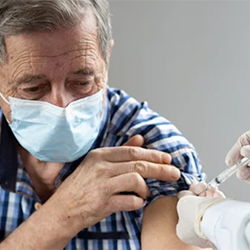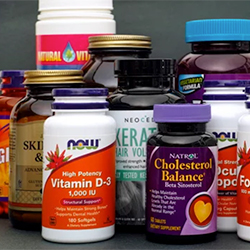By Marie Rosenthal, MS
This week’s roundup discusses the importance of nutrition. More studies are finding that most malnourished patients have poorer outcomes regardless of their diagnosis, and COVID-19 patients are no different. It’s no surprise, but nurses experienced a lot of stress and were unable to bounce back during the pandemic. So, be nice to your nurses. A study from the U.K. talks about what made the first variant spread so quickly. I don’t think the answer will surprise anyone. Older people produce fewer antibodies from the vaccine, but still are well protected. Finally, when the going gets tough, people turn to supplements. Americans are taking even more supplements that they did before the pandemic.
Malnourished COVID-19 Patients Face More Severe Outcomes
Adults and children with COVID-19 who have a history of malnutrition may have an increased likelihood of death and the need for mechanical ventilation (Sci Rep 2021 Jul 22. https://doi.org/10.1038/s41598-021-94138-z).
Malnutrition hampers the function of the immune system and is known to increase the risk for severe infections with other viruses, but the potential long-term effects of malnutrition on COVID-19 outcomes are less clear.
Louis Ehwerhemuepha, PhD, and his colleagues at Children’s Hospital of Orange County, Calif., investigated associations between malnutrition diagnoses and subsequent COVID-19 severity, using medical records for 8,604 children and 94,495 adults (?18 years) who were hospitalized with COVID-19 in the United States between March and June 2020.
Patients with a diagnosis of malnutrition between 2015 and 2019 were compared with patients without it.
Of 520 children (6%) with severe COVID-19, 39 (7.5%) had a previous diagnosis of malnutrition, compared with 125 (1.5%) of 7,959 children (98.45%) with mild COVID-19. Of 11,423 adults (11%) with severe COVID-19, 453 (4%) had a previous diagnosis of malnutrition, compared with 1,557 (1.8%) of 81,515 adults (98.13%) with mild COVID-19.
Children older than 5 years and adults ages 18 to 78 with a previous diagnosis of malnutrition were found to have higher odds of severe COVID-19 than those without this history in the same age groups. Children younger than 5 years and adults ages 79 and older had higher odds of severe COVID-19 if they were not malnourished compared with those of the same ages who were malnourished. In children, this may be due to having fewer medical data for those younger than 5, according to the authors. The risk for severe COVID-19 in adults with and without malnutrition continued to increase with age older than 79 years.
Health Care Workers Not So Resilient During COVID-19
More than 40% of nurses and other health care workers (HCWs) had risks associated with an increased likelihood of burnout during the early phase of the pandemic in 2020, a survey reported (AJN Am J Nursg 2021;121[8]:24-34).

The study identified risk factors for poor well-being and those associated with greater resilience, which may reduce the risk for burnout among hands-on care providers, according to the new research by Lindsay Thompson Munn, RN, PhD, and her colleagues at a health care system in Charlotte, N.C. “The insights gained from this study can help health care leaders to target these risk factors and develop strategies that allow organizations to better support well-being and resilience among clinicians,” they wrote.
The researchers conducted an online survey of nurses and other nonphysician HCWs, and received responses from 2,459 participants who provided direct patient care. The survey focused on risk factors for decreased well-being, a key contributor to the epidemic of burnout among health care professionals.
The survey also evaluated aspects of resilience. Defined as the ability to cope with and adapt positively to adversity, resilience is an important contributor to well-being.
Data were collected in June and July 2020, providing a snapshot of well-being and resilience among HCWs a few months into the pandemic.
At that time, 44% of HCWs surveyed were at increased risk for burnout, fatigue and patient care errors. Analysis of the responses found several factors to be associated with increased odds of poor well-being, including:
- having low scores on a measure of resilience;
- believing that supplies of personal protective equipment (PPE) were insufficient;
- feeling that the organization did not understand HCWs' emotional support needs during the pandemic;
- believing that the workload had increased;
- believing that staffing was inadequate to safely care for patients; and
- having a lower degree of psychological safety (feeling that the work environment was conducive to vulnerability and interpersonal risk-taking).
In contrast, opposite levels of some of the same factors were associated with higher scores for resilience:
- feeling that the organization did understand emotional support needs;
- believing that staff were being redeployed to areas of critical need; and
- having a higher degree of psychological safety.
Less than one-fourth of HCWs had used available resources to support their well-being and resilience (such as meditation apps, employee assistance programs and counseling).
The researchers discussed steps that may help to support resilience while addressing modifiable factors that negatively affect well-being in the health care work environment, such as “paying careful attention to workload and staffing, creating a culture of psychological safety within teams and units, and recognizing and actively addressing the unique challenges posed by the pandemic,” Dr. Munn and her colleagues concluded.
Alpha Variant Spread via ‘Super-Seeding’ Event in U.K.
The rapid spread of the Alpha variant of the SARS-CoV-2 virus was enhanced by large numbers of infected people “exporting” it to multiple parts of the United Kingdom, in what the researchers call a “super-seeding” event (Science 22 Jul 2021: eabj0113 DOI: 10.1126/science.abj0113).
Results of the largest phylogeographic analysis ever conducted maps the spread of the variant (also known as lineage B.1.1.7) from its origins in Kent and Greater London in November 2020, to all but five counties in Wales, Scotland, Northern Ireland and England by Jan. 19.
“The beginning of December 2020, the epicenter of COVID-19 transmission in England shifted rapidly from the North West and North East to London and the South East, as the Alpha variant took hold,” said Moritz Kraemer, DPhil, a Branco Weiss Research Fellow in Oxford University's Department of Zoology. “As people traveled from London and the South East to other areas of the U.K., they 'seeded' new transmission chains of the variant. This continued as a national 'super-seeding' event, which did not start to slow until early January.”
The rapid spread of the Alpha variant across the United Kingdom led to initial reports that it could be up to 80% more transmissible than the original strain. This study, published by researchers at universities including Oxford, Northeastern and Edinburgh, showed mobility significantly affected its spread and early growth rates. According to the researchers, this highlights the need for epidemiologists to work closely with virologists and geneticists rapidly to create accurate transmissibility estimates for new variants.
They found that Alpha's emergence was a combination of genetic changes and transient epidemiological factors, not that it contained genetic changes that made it more transmissible.
“As new variants emerge, we expect they will spread significantly before travel restrictions are put in place, as likely happened with the Delta variant. Given the scale of its current outbreak, it seems probable that the U.K. is now an important exporter of the Delta variant across Europe and some other parts of the world,” Dr. Kraemer said.
“The U.K. has decided to ease its restrictions because of our high vaccination rates and a confidence that we have protected the most vulnerable people in society. But that's not the case in most other countries and the Delta variant could be starting this process again elsewhere, highlighting the urgent need for faster and equitable distribution of vaccines worldwide,” he noted.
Older People Have Fewer COVID-19 Antibodies From Vaccine, But Still Have Good Protection
Older people appear to have fewer antibodies against the novel coronavirus, a new laboratory study from Oregon Health & Science University suggests (JAMA 2021 Jul 21. doi:10.1001/jama.2021.11656).

However, the vaccine was still effective in preventing infection and severe illness in most people, regardless of age, according to Fikadu Tafesse, PhD, an assistant professor of molecular microbiology and immunology in the OHSU School of Medicine, in Portland.
However, with vaccine uptake slowing in Oregon and across the United States, researchers said their findings underscore the importance of promoting vaccinations in local communities.
Vaccinations reduce the spread of the virus and new and potentially more transmissible variants, especially for older people who appear to be more susceptible to breakthrough infections.
“The more people get vaccinated, the less the virus circulates,” Dr. Tafesse said. “Older people aren't entirely safe just because they're vaccinated; the people around them really need to be vaccinated as well. At the end of the day, this study really means that everybody needs to be vaccinated to protect the community.”
The researchers measured the immune response in the blood of 50 people two weeks after their second dose of the Pfizer vaccine against COVID-19. They grouped participants into age groups and then exposed their blood serum in test tubes to the original wild-type SARS-CoV-2 virus and the P.1 variant (also known as gamma) that originated in Brazil.
The youngest group—all in their 20s—had a nearly sevenfold increase in antibody response compared with the oldest group of people between 70 and 82 years. In fact, the laboratory results showed a clear linear progression from youngest to oldest: The younger a participant, the more robust the antibody response.
"Older people might be more susceptible to variants than younger individuals," Dr. Tafesse said.
The findings highlight the importance of vaccinating older people as well as others who may be more vulnerable to COVID-19, said co-author Marcel Curlin, MD, an associate professor of medicine (infectious diseases) in the OHSU School of Medicine.
“The vaccine still produces strong immune responses compared with natural infection in most older individuals, even if they are lower than their younger counterparts," Dr. Curlin said.
Since Pandemic Onset, 3 in 10 Americans Increased Supplement Use
A new survey found that 29% of Americans are taking more supplements today than they were before the COVID-19 pandemic, bringing the percentage of U.S. supplement users to 76%.

Nearly two-thirds of people who increased their supplement use (65%) cited a desire to enhance their overall immunity (57%) or protection from COVID-19 (36%) as reasons for the increase. Other common reasons were to take their health into their own hands (42%), improve their sleep (41%), and improve their mental health (34%).
The survey was conducted online by The Harris Poll on behalf of the Samueli Foundation among 2,053 U.S. adults ages 18 and older, including 1,531 who are currently taking supplements. The survey took place June 15-17, 2021.
“The COVID-19 pandemic is a catalyst for increased supplement use,” said Wayne Jonas, MD, the executive director of Integrative Health Programs at the Samueli Foundation, in Corona Del Mar, Calif. “Supplements, when used under the guidance of health care professionals, can be beneficial for one's health. Unfortunately, however, many people are unaware of the risks and safety issues associated with their use.”
More than half of Americans taking supplements (52%) mistakenly believe that most dietary supplements available for purchase have been declared safe and effective by the FDA, according to the survey of more than 2,000 U.S. adults. Nearly one-third of supplement users (32%) believe that if a supplement could be dangerous, it would not be allowed to be sold in this country.
“Contrary to what many believe, the FDA does not regulate supplements. In fact, many supplements are not identified as dangerous until after people are negatively affected by them,” Dr. Jonas said. “There are benefits to one's health from supplements, but also risks, so I encourage anyone who is taking a supplement or thinking of taking one to discuss it with your health care provider first.”
Fewer than half of Americans who use supplements (47%) say they consulted with their health care provider before use, despite national guidelines that strongly recommend doing so. Further, 46% of Americans currently taking prescription medications say they have not discussed with their health provider the potential interactions that supplements could have with their drugs. But the desire to speak to their physicians is there.
Four in five Americans said they would feel comfortable sharing which supplements they take with their health care provider (81%) and say it is important to tell their health care provider whether or not they are taking supplements (80%). They also identified various barriers to discussing supplements with their health care providers:
- 41% of those currently taking supplements said it hasn't occurred to them to discuss their supplement use with their health care provider, including half of those ages 18-34 years (49%).
- 35% of all Americans said they don't think their health care provider is interested in whether or not they are taking supplements.
- 32% of Americans don't think their health care provider knows enough about supplements to advise them properly.
- 26% of those currently taking supplements are worried that their health care provider will judge them based on the supplements they are taking.
"As more people begin taking supplements, we need to be sure that they have the information needed to make informed and healthy decisions,” Dr. Jonas said. “My obligation, as a physician, is to help patients understand which supplements can play a safe and effective part of their overall health and well-being goals. The good news is that patients are willing to discuss this topic, but it is up to providers to ask.”
Other findings from the survey showed differences based on race and ethnicity:
- 86% of non-Hispanic whites said they would be comfortable sharing which supplements they take with their health care provider.
- Black (49%) and Hispanic (50%) supplement users were more likely than whites (36%) to say it hadn’t occurred to them to discuss their supplement use with their health care provider.
- More than one in three Hispanic adults (35%) said they worry that their health care provider will judge them based on the supplements they take, and 46% said they don't think their health care provider is interested (compared with 31% of non-Hispanic white adults).
The online survey was not based on a probability sample, and no estimate of theoretical sampling error could be calculated.
{RELATED-HORIZONTAL}
